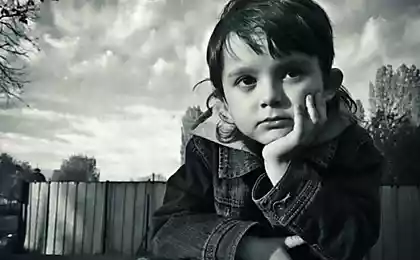465
As parents make children narcissistic Narcissus
All parents consider their children "something special", but here, apparently, we are talking about those who do not see the edges.

More and more parents believe their children something special, but this attitude they cause them psychological harm. This exaggeration contributes to the emergence of narcissism, scientists warn.
More and more children in Western countries experience a painful narcissism. They are arrogant towards others, and expect to be treated special, researchers from the group of Eddie Brumermane from the University of Amsterdam.
They conducted a study on the causes of narcissism, and found their parents. Mothers and fathers considering their children as something special, contribute to this disruption of the structure of personality. It is reported by an international team of scientists in the "Proceedings" of the national Academy of Sciences USA (PNAS).
Psychologists and scientists in the field of pedagogy for two years, every six months, interviewed 565 Dutch children aged 7 to 11 years and their parents. Those children whose parents considered them "better than other children" or "deserve in life something extraordinary", there was subsequently a narcissistic character: they had low sensitivity, but high sensitivity reacted to criticism.
The result is an exaggerated parental attention
It turns out that the welfare of the child is not conducive when fathers or mothers holding him for "the gift of God to mankind." "The children believe their parents when they say they are better than others," said co — author Brad Bushman from the University of Columbus, Ohio, in statements of the University. "It is bad for them and for society."
According to researchers narcissism represents the result of exaggerated parental attention, no less. It confirms the social theory of learning and is contrary to psychoanalytic assumptions, they write.
Junior psychiatrist Michael Winterhoff from Bonn sees the reasons for this are also escalating stress of parents: "parents Today feel under increasing pressure." "And they will certainly want their child to have a better life. So the children get more and more". But this does not make them more ready to study and achieve high results.
Unable to delay the satisfaction of their needs
"We have to realize that these people are not viable," — said the expert. "For example, they are not able to postpone the satisfaction of their own needs." In school, they often refuse to answer. About them it is impossible to say that it is happy children.
At the same time, narcissism should not be confused with a heightened sense of self-esteem, caution the researchers. Parents seeking children with great emotional warmth, reinforce this feeling.
"People with high self-esteem see themselves on an equal basis with others, and the daffodils are standing above," explains Bushman.
How to identify a narcissist
The official criteria according to which specialists determine the stage of pathological narcissism (the"Diagnostic and statistical manual of mental disorders", fourth edition). Must be installed at least five criteria:
1. Narcissists have grandiose (Yes, grandioses — svonb) self esteem overestimate their own abilities and talents, and expect to be treated as something special.
2. Narcissists fantasize about unlimited success, power, brilliance, beauty or ideal love.
3. Narcissists believe that they are "special" or one of a kind that they can understand others only special or high-profile people (or institutions). Most likely they surround themselves with like them.
4. Narcissists require excessive admiration.
5. Narcissists expect that they are treated particularly well, and that each person is immediately and automatically agree to their request.
6. Narcissists use others to achieve his own purposes (and who, then, selfish? — svonb).
7. The narcissist lacks empathy.
8. Narcissists are envious of others or believe that they themselves envy other people.
9. Daffodils arrogant, haughty behavior or attitudes. published Author: Rebecca Krizak
P. S. And remember, only by changing their consumption — together we change the world! ©
Source: svonb.livejournal.com/888112.html

More and more parents believe their children something special, but this attitude they cause them psychological harm. This exaggeration contributes to the emergence of narcissism, scientists warn.
More and more children in Western countries experience a painful narcissism. They are arrogant towards others, and expect to be treated special, researchers from the group of Eddie Brumermane from the University of Amsterdam.
They conducted a study on the causes of narcissism, and found their parents. Mothers and fathers considering their children as something special, contribute to this disruption of the structure of personality. It is reported by an international team of scientists in the "Proceedings" of the national Academy of Sciences USA (PNAS).
Psychologists and scientists in the field of pedagogy for two years, every six months, interviewed 565 Dutch children aged 7 to 11 years and their parents. Those children whose parents considered them "better than other children" or "deserve in life something extraordinary", there was subsequently a narcissistic character: they had low sensitivity, but high sensitivity reacted to criticism.
The result is an exaggerated parental attention
It turns out that the welfare of the child is not conducive when fathers or mothers holding him for "the gift of God to mankind." "The children believe their parents when they say they are better than others," said co — author Brad Bushman from the University of Columbus, Ohio, in statements of the University. "It is bad for them and for society."
According to researchers narcissism represents the result of exaggerated parental attention, no less. It confirms the social theory of learning and is contrary to psychoanalytic assumptions, they write.
Junior psychiatrist Michael Winterhoff from Bonn sees the reasons for this are also escalating stress of parents: "parents Today feel under increasing pressure." "And they will certainly want their child to have a better life. So the children get more and more". But this does not make them more ready to study and achieve high results.
Unable to delay the satisfaction of their needs
"We have to realize that these people are not viable," — said the expert. "For example, they are not able to postpone the satisfaction of their own needs." In school, they often refuse to answer. About them it is impossible to say that it is happy children.
At the same time, narcissism should not be confused with a heightened sense of self-esteem, caution the researchers. Parents seeking children with great emotional warmth, reinforce this feeling.
"People with high self-esteem see themselves on an equal basis with others, and the daffodils are standing above," explains Bushman.
How to identify a narcissist
The official criteria according to which specialists determine the stage of pathological narcissism (the"Diagnostic and statistical manual of mental disorders", fourth edition). Must be installed at least five criteria:
1. Narcissists have grandiose (Yes, grandioses — svonb) self esteem overestimate their own abilities and talents, and expect to be treated as something special.
2. Narcissists fantasize about unlimited success, power, brilliance, beauty or ideal love.
3. Narcissists believe that they are "special" or one of a kind that they can understand others only special or high-profile people (or institutions). Most likely they surround themselves with like them.
4. Narcissists require excessive admiration.
5. Narcissists expect that they are treated particularly well, and that each person is immediately and automatically agree to their request.
6. Narcissists use others to achieve his own purposes (and who, then, selfish? — svonb).
7. The narcissist lacks empathy.
8. Narcissists are envious of others or believe that they themselves envy other people.
9. Daffodils arrogant, haughty behavior or attitudes. published Author: Rebecca Krizak
P. S. And remember, only by changing their consumption — together we change the world! ©
Source: svonb.livejournal.com/888112.html
























